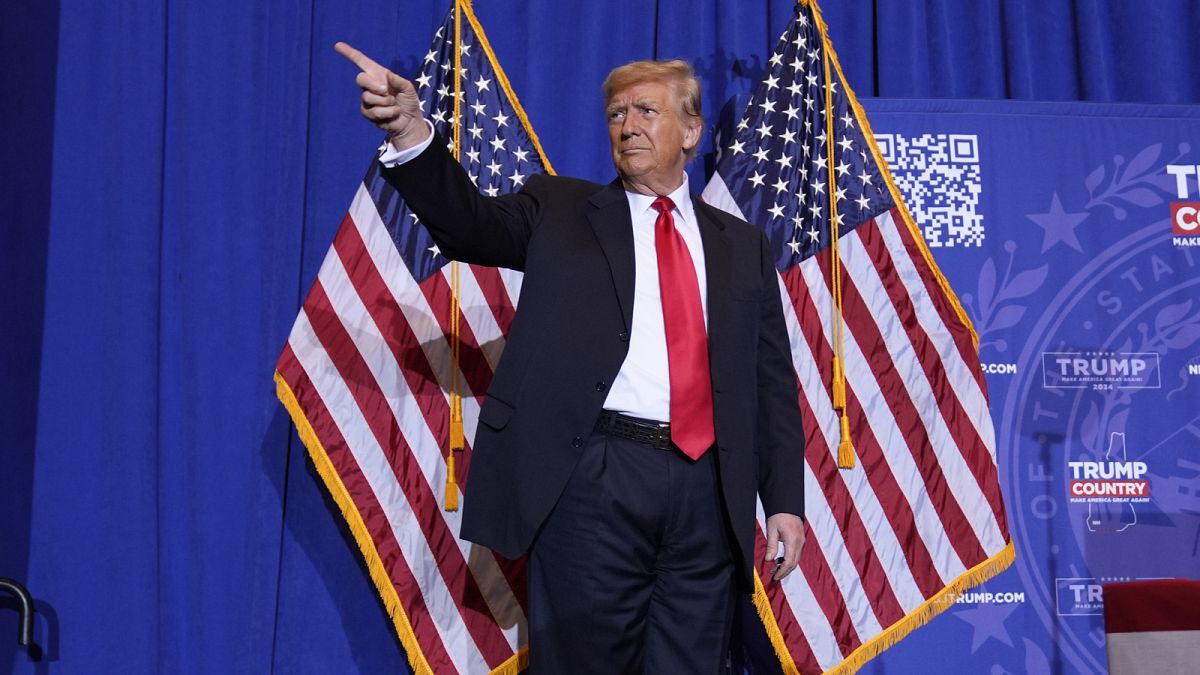Trump's return to the White House after his decisive victory in the Iowa caucus could spell trouble for the European Union.
A renewed trade war and lesser support for Ukraine are just some of the issues facing the EU if former President Donald Trump returns to the White House.
Belgium's Prime Minister Alexander De Croo - who has taken over the rotating presidency of the Council of the EU - warned in a speech to MEPs earlier this week the bloc could be bereft of one of his biggest allies this year should "America First" prevail again. But he said Europe should not fear a scenario where the US leaves it on its own.
"2024 will be a crucial year [...] where our democracies and our liberties will be put to the test. Not only with the election for this house, but equally so for US Congress, equally so with an election for the American presidency.
"If 2024 brings us “America First” again, it will be more than ever Europe on its own. We should as Europeans not fear that prospect – we should embrace it," said De Croo.
But what issues should the EU be aware of, if Trump were to come back into power?
TRUMP AND TRADE
A Trump return to the White House could mean a new EU-US trade tariff war, after four years of relative calm during the Biden administration.
One of the defining instances of Trump's first mandate - for the EU - was the imposed tariffs on several EU products, including steel and aluminium.
The tariffs were a response to a government investigation that concluded metal imports - namely from China - threatened national security. In an effort to protect American manufacturers, in March 2018 Trump announced tariffs of 25 percent on imports of steel and 10 percent on imports of aluminum.
Although the tariffs were largely motivated by combatting China, they namely affected NATO members and other allies. Earlier US administrations had imposed anti-dumping measures on Chinese imports, which had already mostly stopped the import of steel and aluminum from China.
To begin with, the Trump administration gave the EU and six other key trading partners a chance to negotiate trade deals. But, unable to agree, the EU, Canada and Mexico were hit with tariffs in June 2018.
The discord led to the EU filing a formal trade dispute against Trump's national security tariffs with the World Trade Organisation (WTO).
So could it happen again?
"We don't sleep very soundly. It's true that the world context has changed [...] war and global instability could, on the one hand, lead to more lenient advice," Italian MEP Tiziana Beghin, from The Five Star Movement party, told Euronews.
"On the other hand, it is also true that even with this administration, albeit with decidedly more relaxed tones and a postponement over time of what could be the problem, especially regarding steel and aluminum, we have not seen an extremely collaborative country," she added.
TROUBLE FOR UKRAINE?
Trade is not the only issue the EU is worried about. The US has been the biggest donor to Ukraine in almost two years of war.
But there has been discord within the EU and within the US over funds to Ukraine.
EU Commission President Ursula von der Leyen told Euronews this week that despite a veto from Hungary's Viktor Orbán for a €50-billion EU special fund for Ukraine, the bloc would, if needed, find a way to provide the money.
The vetoed package, which is designed to provide Kyiv with financial support until 2027 and plug the government's ballooning public deficit, is an impasse that has left Brussels effectively without any money for the war-torn nation.
Across the pond in Washington, there is also discord on how exactly to approach funding Ukraine. Negotiations are ongoing in Congress - but talks have so far failed to produce an agreement.
In the House of Representatives and subsequently in the Senate, Republicans have begun to demand any aid for Kyiv be made conditional on strengthening immigration law and US-Mexico border protections. The issue is sure to become a pivotal part of the 2024 election campaign.
But with deep divisions in US politics and society more widely, an agreement on immigration issues may be difficult to achieve - despite growing pressure from Ukraine's president, Volodymyr Zelenskyy.
If Trump - whose approach to immigration is often symbiotic with right-wing ideologies - wins the White House in November, the US could become an unreliable ally.
"The biggest challenge dealing with Mr Trump is that he is so unpredictable," David McAllister, MEP for the European People's Party told Euronews. "He has said one thing on Ukraine: that he will support Ukraine as much as required - but on the other hand is questioning further US support for Ukraine. So you never know exactly what his view is."
This is only the first chapter in a very long race. Despite Trump's Iowa victory, the former president needs to win more caucuses, which may not be so easy. The GOP context moves next to New Hampshire, which may not be so clear-cut for the former president.
